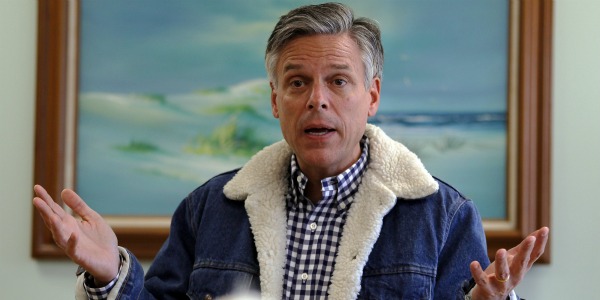Jon Huntsman, the former Utah governor and current Republican presidential candidate, earned accolades from environmental advocates earlier this year for denouncing his fellow presidential contenders — chiefly Texas Gov. Rick Perry and Minnesota Congresswoman Michele Bachmann — for their regressive views on matters of science, including human-induced global warming.
“When you make comments that fly in the face of what 98 out of 100 climate scientists have said, when you call into question the science of evolution — ” said Huntsman during an early September debate. “All I’m saying is that in order for the Republican party to win, we can’t run from science.”
Now it appears that Huntsman, a former U.S. ambassador to China who has been trailing badly in the polls, is recalibrating his own thoughts on the science behind global warming.
At an event hosted by the conservative Heritage Foundation on Tuesday, Huntsman was asked whether he believed that human beings are “significantly or primarily contributing to the earth’s warming climate,” and if so, what policies he would put in place to address the issue.
“The scientific community owes us more in terms of a better description or explanation about what might lie beneath all of this,” Huntsman responded, “but there’s not enough information right now to be able to formulate policies in terms of addressing it overall — primarily because it’s a global issue. We can enact policies here, but I wouldn’t want to unilaterally disarm as a country. I wouldn’t want to hinder job creators during a time when our economy is flat.”
Tim Miller, a spokesman for Huntsman, said in an email, “Governor Huntsman’s comments today are consistent with his view that he trusts the body of science on global warming, but there’s not global consensus and we can’t disarm or hurt our job creators since this is a global problem.”
Huntsman’s finessing of his message comes against the backdrop of global climate talks in Durban, South Africa, where delegates are struggling to find a way forward on a variety of proposals to curb greenhouse gas emissions and help poor nations deal with the impacts of climate change. Chief among the obstacles to progress in Durban is lack of consensus among major emitters of the industrialized world — principally the United States — and the rising industrial powers of the developing world, including India, Brazil, South Africa and China.
Read the rest at Huffington Post
Photo: Brian Snyder / Reuters
